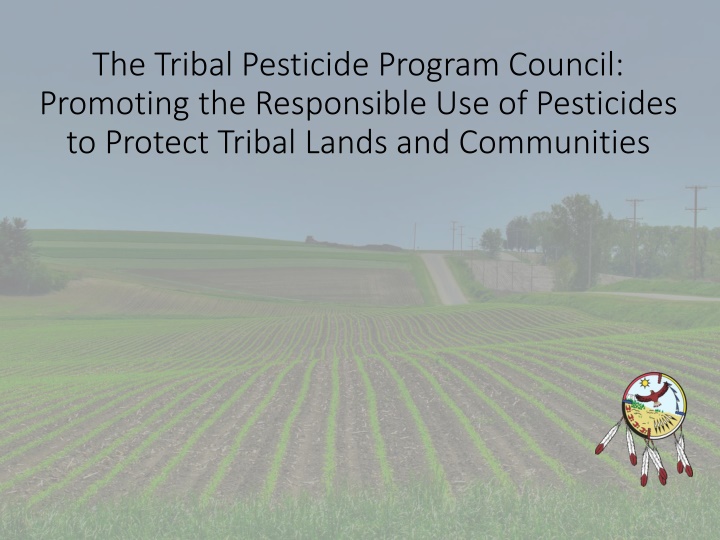
Promoting Responsible Pesticide Use for Tribal Lands
The Tribal Pesticide Program Council (TPPC) was established in 1997 with support from the EPA to serve as a technical resource and policy development group focusing on pesticide issues affecting tribal lands. With a membership of 100 individuals from 64 tribes and organizations, the TPPC collaborates with various groups and addresses issues like Integrated Pest Management, Worker Protection, Pesticide Drift, and more through meetings and calls.
Download Presentation

Please find below an Image/Link to download the presentation.
The content on the website is provided AS IS for your information and personal use only. It may not be sold, licensed, or shared on other websites without obtaining consent from the author. If you encounter any issues during the download, it is possible that the publisher has removed the file from their server.
You are allowed to download the files provided on this website for personal or commercial use, subject to the condition that they are used lawfully. All files are the property of their respective owners.
The content on the website is provided AS IS for your information and personal use only. It may not be sold, licensed, or shared on other websites without obtaining consent from the author.
E N D
Presentation Transcript
The Tribal Pesticide Program Council: Promoting the Responsible Use of Pesticides to Protect Tribal Lands and Communities
The Tribal Pesticide Program Council Established in 1997, with support from the EPA s Office of Pesticide Programs Purpose: to be a tribal technical resource and program/policy development dialogue group, focused on pesticides issues and concerns (both agricultural and structural) Funded through a cooperative agreement between the EPA and the Institute for Tribal Environmental Professionals (ITEP) at Northern Arizona University Not a substitute for government-to-government consultation
Membership & Governance Made up of individuals from Tribes and tribal organizations across the country Currently comprised of 100 members from 64 Tribes and tribal organizations Governed by an Executive Committee with a chair and co- chair, representatives from each of the 10 EPA regions plus Alaska, and 4 at-large representatives Executive Committee members elected for 2-year terms
Calls and Meetings Executive Committee calls are held each month these are open to anyone, and often include presentations by EPA or other federal agencies Full Council meetings held in person twice a year, typically one at a tribal facility and the other in Washington, DC to meet with federal officials The Fall 2023 in-person meeting at the Choctaw Nation
Collaborators The TPPC works on issues of common interest with groups such as: National Tribal Operations Committee (NTOC) Regional Tribal Operations Committees (RTOC) The EPA American Indian Environmental Office (AIEO) The Pesticide Program Dialogue Committee (PPDC) The State FIFRA Issues Research & Evaluations Group (SFIREG) Association of American Pesticide Control Officers (AAPCO) Association of Structural Pest Control Regulatory Officials (ASPCRO)
Issues Addressed by the TPPC Integrated Pest Management (IPM) Worker Protection Standard Pest Control in Schools and other Tribal Facilities Certification & Training Endangered Species Pesticide Drift Structural Pesticide Use Agricultural Use Bed Bugs/Pests Plus we have three workgroups that meet monthly to focus on broad topics including: Pollinator Protection Risk Assessment Policy
TPPC Assistance to Tribes Pesticide education, research, and program development, seeking to ensure that tribes with less experience can develop mentoring/coaching relationships with more experienced tribes Informational resources such as a bed bug educational package to help Tribes address common pest problems Training & webinars on subjects of interest to members A quarterly newsletter with feature articles, upcoming events, TPPC contact lists, and more A listserv used to distribute information about the group and pesticide issues A website with valuable information on Tribes and pesticides
TPPC Engagement with EPA and Other Federal Agencies White papers & issue papers on topics such as the federal plan for certification of applicators in Indian Country, tribal pesticide training needs, concerns about cannabis cultivation on tribal lands Comments on impending regulatory actions such as the regulation of pesticide-treated seeds, regulation of rodenticides, EPA Office of Enforcement and Compliance Assurance Cooperative Agreement Guidance, and EPA s Strategic Plan EPA Tribal Pesticide Team members attend all TPPC calls and meetings to inform members of upcoming actions and convey tribal concerns back to the agency
How to Get Involved Check out our website: https://tppcwebsite.org Contact TPPC Coordinator at Mark.Daniels@nau.edu or 928-523-8897 Join one of our monthly Executive Committee calls on the third Wednesday of every month, from 2-4 PM Eastern Subscribe to our listserv to stay informed Thank you for your attention!






















